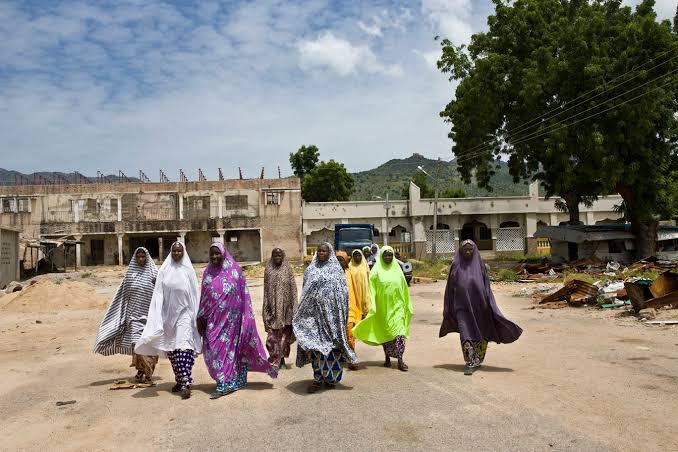Borno Women Move In Groups To Minimise Risk Of Attacks, Abduction
Women are beginning to devise means to survive as they face daily threats of violence in Borno, Northeast Nigeria.

Hundreds of women and girls have been observed going to the farm in groups across Central and Southern Borno, Northeast Nigeria.
The different clusters of women HumAngle encountered were daily wage labourers, trekking long distances from their communities to farmlands on Sunday, June 20.
The daily routine starts shortly after dawn, where women meet and trek to the farms. Between 4 and 5 p.m., they start converging at designated points to begin the journey back to their respective communities before nightfall.
The women said each time they travel in droves, they rarely face the threat of abduction, except if a few of them, especially the girls, stray from the crowd.
Male inhabitants of the communities were missing among the crowds observed by HumAngle, possibly over fears of Boko Haram attacks or arbitrary arrest by security forces.
There were vigilantes and members of the Civilian Joint Task Force on motorcycles, ensuring the crowd’s safety all day long as they worked on farms.
Some of the women interviewed by HumAngle said despite the threat of going to the farm every day to earn a living and find food; it is better than staying back in their communities or IDP Camps relying on food vouchers.
The food provided by the government and NGOs is barely enough or sometimes nonexistent.
In March 2015, it was reported that Boko Haram detained dozens of women in Gwoza town, which the group had seized in 2014.
Women and Girls are targeted during attacks by terror groups in Northeastern Nigeria, and they face violence, including murder, abduction, and sexual violence.
In a report published in March, the Director of Amnesty International Nigeria, Osai Ojigho, said, “As Boko Haram continues their relentless cycle of killings, abductions, and looting, they are also subjecting women and girls to rape and other sexual violence during their attacks.”
Ojigho said the atrocities committed against women and children in northeast Nigeria amount to “war crimes.”
The conflict in the region has killed over 37,500 people and displaced millions more, according to the Council On Foreign Relations’ Nigeria Security Tracker.
Support Our Journalism
There are millions of ordinary people affected by conflict in Africa whose stories are missing in the mainstream media. HumAngle is determined to tell those challenging and under-reported stories, hoping that the people impacted by these conflicts will find the safety and security they deserve.
To ensure that we continue to provide public service coverage, we have a small favour to ask you. We want you to be part of our journalistic endeavour by contributing a token to us.
Your donation will further promote a robust, free, and independent media.
Donate HereStay Closer To The Stories That Matter




